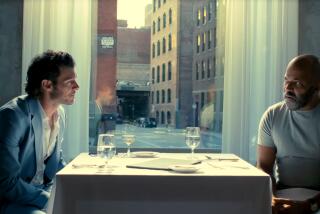‘Giant’ Doesn’t Quite Live Up to Its Legend
- Share via
Time has not been as kind to “Giant” as you wish it had. George Stevens’ 1956 film of the Edna Ferber novel flows beautifully in its earliest sections, set circa 1925, but begins to lose momentum after leaping to 1941 and finally to sometime in the early ‘50s, when the filmmakers labor mightily to tie everything up. Even so, Stevens enriched the novel, adapted by Fred Guiol and Ivan Moffat, giving it depth and dimension.
At 202 minutes, it’s just too long, yet it has the pull of nostalgia (if you’re of a certain age) and sustains its emotional impact as a portrait of a durable marriage. It dazzles with late Golden Era star performances, as Rock Hudson’s Bick Benedict, the Texas rancher, sweeps Elizabeth Taylor’s Virginia aristocrat Leslie Lynnton off her feet and plunks her down right smack in the middle of Reata, his ancestral 595,000-acre spread.
Bick and Leslie convincingly love each other deeply, and over the decades the liberal Leslie gets her devoted husband to see beyond himself as the ancestral master of all he surveys and to develop a social conscience. There’s a sense of real give-and-take between the Benedicts that gives us the feeling that we’re watching the history of a real, if idealized, marriage unfold before our eyes.
*
The towering Hudson, furthermore, has the scale and authority that makes him perfectly cast as the fair-minded, principled, sometimes obtuse but never close-minded ruler of Reata. More than anyone else it is Hudson who holds the film together, a rugged, handsome Benedict to match cinematographer William C. Mellor’s endless Texas vistas and to match the astonishing beauty and quick wit of Taylor’s Leslie.
Indeed, Hudson received an Oscar nomination for his portrayal of Benedict but lost to Yul Brynner for “The King and I.”
Although Benedict’s gradual enlightenment is most persuasive, “Giant’s” handling of discrimination against Mexican Americans, although surely accurate, becomes terribly heavy-handed. Stevens was arguably politically correct to lay it on thick back in the conservative ‘50s, but a subtler touch would seem less dated today.
Dimitri Tiomkin’s score, florid as it is, is not as obtrusive as you might expect; you just wish it wasn’t quite so ubiquitous.
“Giant” is of course most famous as James Dean’s final film, and while he certainly projects his unique vulnerability as Jett Rink, the Reata cowhand who becomes a Texas oil tycoon, there is something a little extraneous about Rink because not enough screen time is devoted to him. (He, too, earned a best actor nomination.)
There’s no doubting his resentment of Benedict and his attraction to Leslie, but are these the reasons why he turns into a raving drunk? It’s as if he’s being punished for his ambition, lack of traditional family values and nouveau riche bad taste.
*
“Giant” mainly benefits from its large, notable cast, especially from Jane Withers. She embodies a good-hearted vulgarity as a loyal, kindly woman who had her own heart set on Bick yet extends the gift of enduring friendship to both Bick and Leslie.
Where “Giant” is absolutely flawless is in Boris Leven’s production design, with the Benedicts’ superb Second Empire mansion--its rich Renaissance Revival interiors eventually giving way to white paint and boring Williamsburg-style reproduction furniture and finally to tasteful ‘50s luxe glamour.
Marjorie Best’s costumes similarly evolve while Moss Mabry’s costumes for Taylor suggest period less emphatically, representing Leslie’s timeless good taste.
Painstakingly restored for a 40th anniversary release, “Giant” is far from a great film but undeniably a classic of its era.
* MPAA rating: G. Times guidelines: It is suitable for all ages.
(BEGIN TEXT OF INFOBOX / INFOGRAPHIC)
‘Giant’
Elizabeth Taylor: Leslie Lynnton
Rock Hudson: Bick Benedict
James Dean: Jett Rink
Carroll Baker: Luz Benedict II
A Warner Bros. presentation. Director George Stevens. Producers George Stevens and Henry Ginsberg. Screenplay by Fred Guiol and Ivan Moffat. Cinematographer William C. Mellor. Editor William Hornbeck. Costumes Marjorie Best. Taylor’s costumes by Moss Mabry. Music Dimitri Tiomkin. Production designer Boris Leven. Set decorator Ralph Hurst. Running time: 3 hours, 22 minutes.
* Exclusively at the Cinerama Dome, Sunset Boulevard, west of Vine Street, (213) 466-3401.
More to Read
Only good movies
Get the Indie Focus newsletter, Mark Olsen's weekly guide to the world of cinema.
You may occasionally receive promotional content from the Los Angeles Times.









